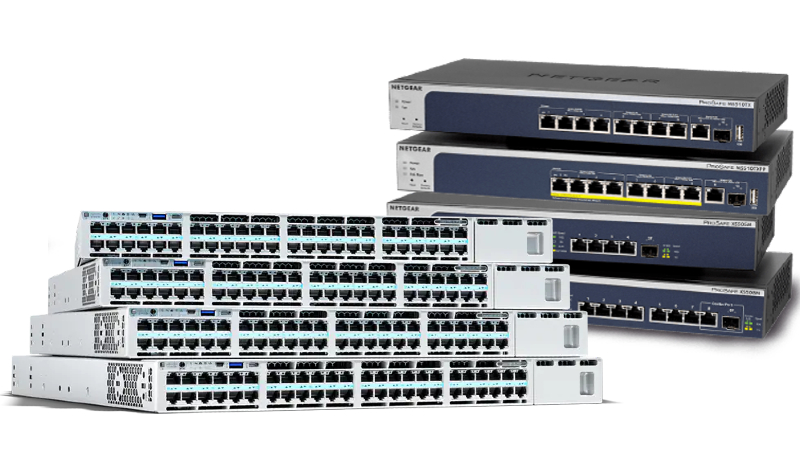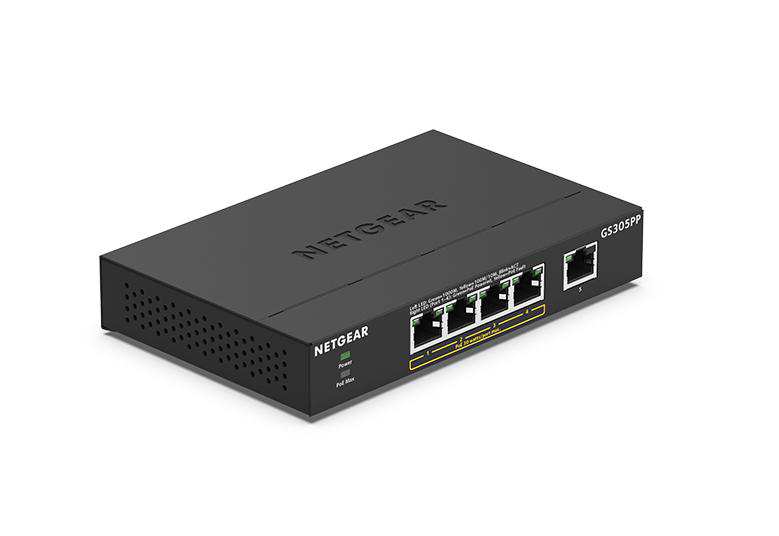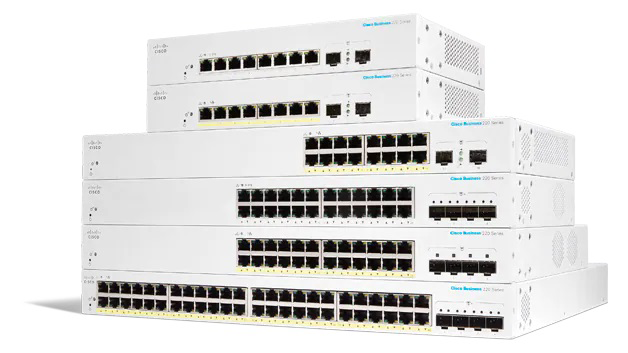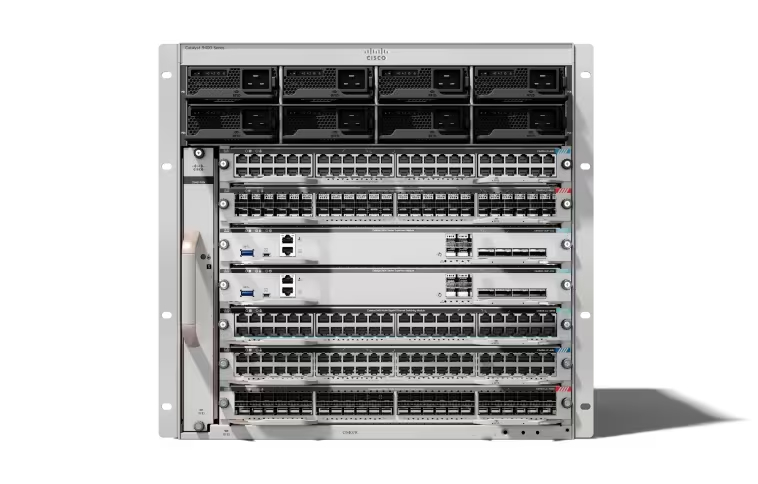
Netgear and Cisco are leading manufacturers of ethernet switches, each with its own strengths. Netgear is known for its affordable and easy-to-use products, while Cisco is known for its high-performance and feature-rich switches.
While both brands have a wide range of models to attract all types of buyers, they tend to be more popular among different sectors:
Here is an overview of each brand’s offerings, their strengths and weaknesses, and when to choose one or the other for your organization.
Table of Contents
Netgear vs. Cisco at a glance
| Feature | Cisco | Netgear |
|---|---|---|
| Price | Starts at $60 | Starts at $14.99 |
| Home models | Yes | Yes |
| Port density | Up to 48 ports and stackable | Up to 48 ports and stackable |
| Speed | Up to 72 Gbps | Up to 96 Gbps |
| Managed and unmanaged | Yes | Yes |
| Scalable | Yes | Yes |
| Reliability and security | Good | Excellent |
| Advanced operations, data centers and industrial uses | Good | Excellent |
Best for pricing: Netgear
For those looking for ethernet switches on a budget, Netgear is an attractive option, as Cisco switches tend to be more expensive.
Both brands offer great value for price, but Netgear specializes in easy-to-use, affordable switches. This applies to its whole range of ethernet switches, from the most basic for home and small businesses to the more advanced.
Best for home users: Netgear
Home users want ethernet switches that are easy to use, fully managed, plug and play, and have good speed and security. They also usually do not require a lot of ports.
This is a niche market that Netgear has mastered with products like its 300 Series SOHO Unmanaged Switch 5-Port with 4-Ports PoE+ (83W) (Figure A) for $59.99, its 5-Port Gigabit Plus Switch Series (GS105Ev2) and Gigabit Unmanaged Switch Series (GS105), and its essential Home/Office Ethernet Switch Series (GS605v5) for just $34.99.
The brand gives home consumers precisely what they need. Netgear also has 8, 16, and more port models for users that require more ports.

On the other hand, while Cisco’s main strength is focused on small, medium, and large enterprises, the brand does offer some options for home users. These include the MS120-8 Compact access switch with optional PoE. The product has eight 1G ports. However, it retails for over $650. The more affordable product of Cisco is the Business 110 for just $60.
Best for small and medium businesses (SMBs): Cisco
Small and medium businesses that are not limited by budget and are looking for robust, reliable, high-performing ethernet switches might find better options in Cisco’s products.
Cisco small business ethernet switches are designed for flexibility and simplicity. They can be cloud-managed, getting automatic updates delivered directly to the switch from the cloud, or can be on-premises. Cisco products for this sector range from the Cisco Business 110 Series to the Cisco Business 220 Series Smart Switches for $150, the Meraki Go GS110 Network Switch Series for $299, and the more advanced Catalyst 1000 Series Switches.

Netgear options for small businesses include the Multi-Gig series, the smart switches series with optional Remote/Cloud Management, and a range of Power over Ethernet (PoE) switches.
PoE will allow you to power smart devices and endpoints such as VoIP phones, surveillance cameras, or wireless access points. Before making a purchase, always consider PoE capacity, in addition to switch speeds and the number of ports you need.
Another vital feature to consider, especially if your SMB has expansion plans, is whether the switch is standalone or stackable.
Finally, small business owners not heavily IT-committed might consider unmanaged switches; these come with plug-and-play features, which require no advanced knowledge for setup, deployment, operation, and maintenance. It is important to understand that unmanaged switches have limited capabilities and cannot be modified or managed. These types of switches are often used in home and small office network environments.
Best for large businesses and data centers: Cisco
Founded in 1984, Cisco brings almost 40 years of experience and leadership to the industrial ethernet switch market. The brand’s extensive business and data center products are known for their high performance, reliability and security. They are also very scalable and stackable, making them ideal for large enterprises and data centers.
Cisco offers many ethernet switches for large enterprises running advanced operations. Some options include:
- Cisco Catalyst 9000 Series Switches (Figure C).
- Cisco Nexus 9000 Series Switches, providing industry-leading data-center performance.
- Cisco Catalyst 6500 Series Switches.
- Cisco Catalyst IE9300 Rugged Series Switches for industrial uses.

Alternatives from Netgear are more affordable but still offer good performance and reliability. Some popular Netgear ethernet switch models for large enterprises and data centers include:
- Netgear ProSafe Gigabit Smart Switch.
- Netgear ProSafe Plus Gigabit Smart Switch.
- Netgear ProSafe Managed Gigabit Smart Switch.
Netgear also offers specialized ethernet switches for Audio-Visual solutions, such as the M4250 AVLine.
Strengths: Cisco vs. Netgear
Let’s dive into each brand’s strengths to understand which is the right fit for your home or business.
Cisco’s advantages are:
- Performance: Cisco ethernet switches can handle high traffic loads and provide low latency for VoIP and video streaming applications.
- Reliability: Cisco ethernet switches are very reliable, designed to operate 24/7, and are backed by a warranty.
- Security: Cisco offers high protection and switches can be configured to prevent unauthorized access to the network and protect data from unauthorized access.
- Scalability: Cisco ethernet switches can be easily added to or expanded as your network grows.
On the other hand, the advantages of Netgear ethernet switches are:
- Affordability: Netgear ethernet switches are more affordable than Cisco ethernet switches, making them a great option if your company is on a budget.
- Ease of use: Netgear ethernet switches are easy to use. They can be rapidly deployed. The brand is known for its unmanaged switches with plug-and-play features.
- Warranty: Netgear backs up all its products with an extended warranty. This gives you peace of mind knowing that your investment is protected.
Why shouldn’t you use Netgear or Cisco?
Who shouldn’t use Netgear?
There are several cases in which users may want to stay clear of Netgear. Multinational, industrial, massive data centers, and other sophisticated IT operations with high demands for speed, latency and traffic should consider using Cisco products instead. These products might be more expensive, but they will meet the high requirements of these types of business.
Who shouldn’t use Cisco?
Homeowners and small and medium businesses looking for fast connections and reliable solutions, but on a very tight budget, will probably want to avoid Cisco. The price of Cisco ethernet switches can be much higher than that of Netgear. And while Netgear’s cost may be low, they still provide great value.
Top 3 Netgear and Cisco alternatives
There are other options in the market besides Netgear and Cisco. Aruba Networks, Juniper Networks, and Dell ethernet switches are three popular alternatives.
Aruba Networks is a well-known brand in the networking industry. Its ethernet switches are high performing, reliable, and secure. Aruba switches are also scalable and ideal for large enterprises and data centers.
Juniper Networks is another well-respected brand in the networking industry. Juniper switches offer a wide range of features and capabilities, making them a good choice for businesses with demanding network requirements.
Finally, Dell also provides ethernet switches built on its experience as a leading IT solutions provider. Dell ethernet switches are robust and powerful, suitable for both home and business networks.
Bottom line: NetGear vs. Cisco ethernet switches
When it comes to the best ethernet switch, there is no one-size-fits-all solution. The best choice will depend on several factors, such as what speed you need, how many ports you have, what your security and traffic demands are, and if you need to power devices. Additionally, managed or unmanaged, cloud or on-premises, can be deal-breaking features.
Cisco and Netgear are both reputable brands that offer a wide range of ethernet switches. Both can deliver excellent value, and which brand you choose should depend on your needs and your budget. If you need a high-performance, reliable and secure ethernet switch, Cisco is a good option, while if you are looking for an affordable and easy-to-use ethernet switch, Netgear is the way to go.
For more top networking options, see our full rundown of the best network switches available on today’s market.



